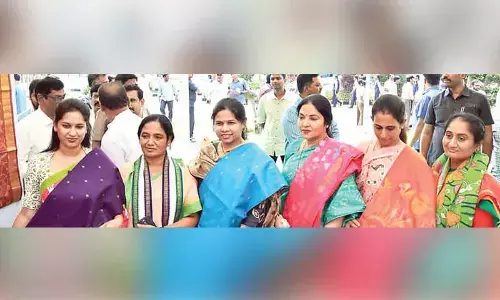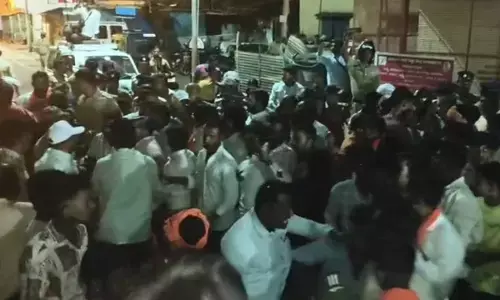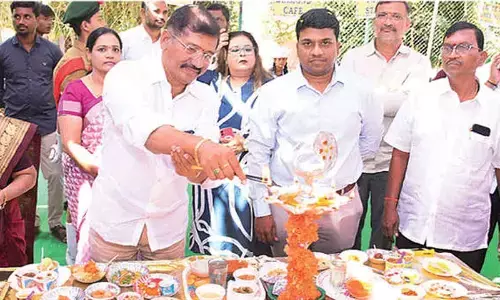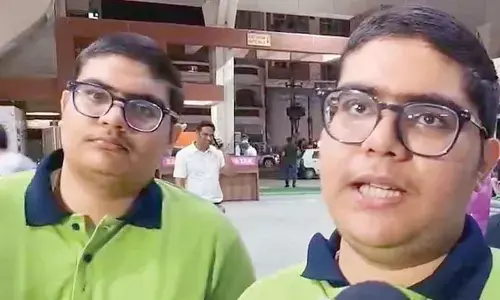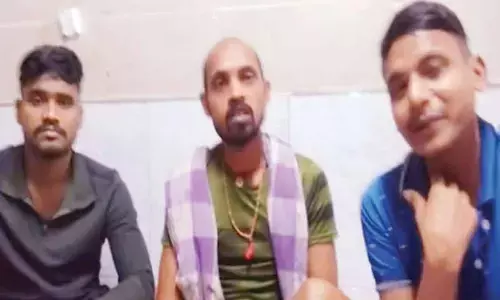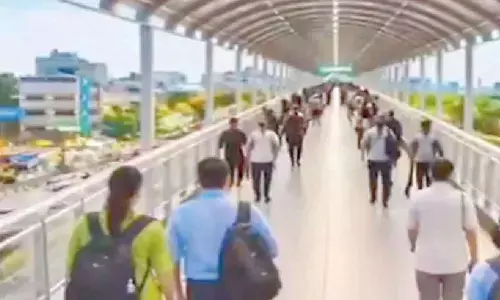Disorder facilitates draconian laws
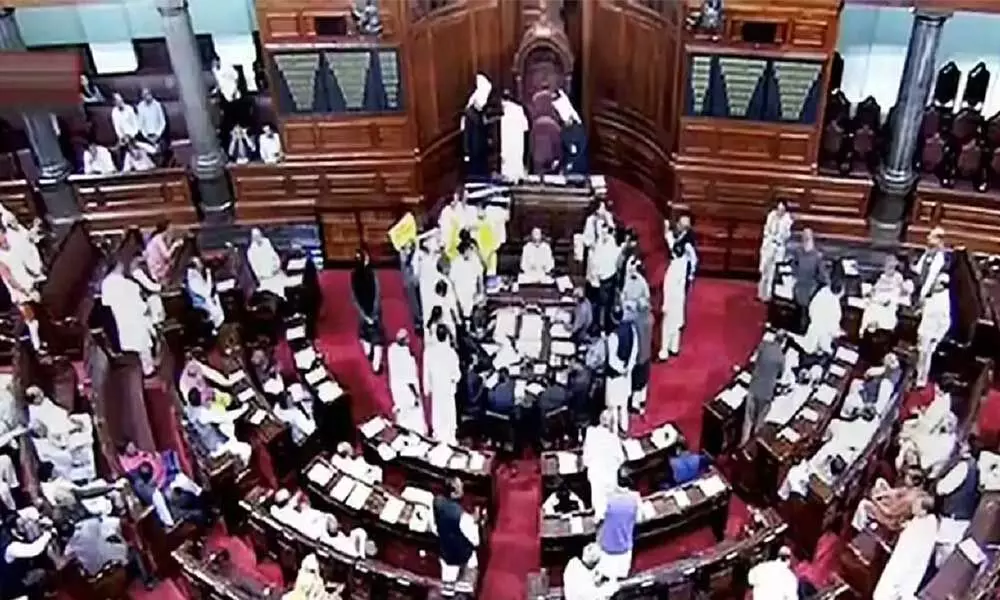
Disorder facilitates draconian laws
The present session of Parliament began with a 'suspension' and series of adjournments on 'suspension.'
The present session of Parliament began with a 'suspension' and series of adjournments on 'suspension.' Rajya Sabha Presiding Officer and Vice President M Venkaiah Naidu suspended 12 MPs till the end of this session allegedly due to their behaviour on August 11 of the Monsoon Session under Rule 256. The suspension notice stated these, "MPs have lowered the dignity of the House by unprecedented acts of misconduct through their violent behaviour and 'intentional attacks' on security personnel on the last day of the Monsoon Session on August 11." It was introduced by Parliamentary Affairs Minister Prahlad Joshi, and then was passed by a voice vote in the Rajya Sabha. Vice Chairman's opening address was about this, who said "bitter and unpleasant experiences" of the last monsoon session "still continue to haunt most of us."
The opposition criticised the 'suspensions' as arbitrary and denying the punished members to present their version. Some of the suspended MPs alleged that Rajya Sabha marshals pushed them. The incident happened when they were objecting to the passage of the Insurance (Amendment) Bill. At the time, the leader of opposition in Rajya Sabha, Mallikarjun Kharge, said there were more marshals than the MPs in the Rajya Sabha. He alleged the marshals manhandled women MPs. Joshi did not agree with this. He said: "the opposition MPs had manhandled the marshals … All the CCTV cameras should be checked. In fact [the opposition MPs] manhandled the male marshals. They grabbed these male marshals by their necks. They were especially from TMC (Trinamool Congress). ...together pushed the female marshals."
Shiv Sena's MP Priyanka Chaturvedi, one of the suspended, raised the point of male marshals jostling female MPs, which is recorded by CCTV. She condemned the order of suspension without watching footage and hearing her version. The opposition parties contended that "outsiders" who were not part of "Parliament security" were brought into the House to "manhandle" MPs, including women members, during the passage of the General Insurance Business (Nationalization) Amendment Bill, and described that what had happened in the House was "unprecedented" and was akin to "martial law" being imposed in Parliament.
Union Minister and Leader of Rajya Sabha Piyush Goyal vehemently criticised the opposition, saying that the suspension of the 12 members from the Rajya Sabha was important to maintain the dignity of the House. He demanded that all those guilty of disrupting the House in the Monsoon Session not only apologise to the Chair but also the House and the nation as well. He further explained the scene on the final day of the Monsoon Session when opposition MPs entered the well and continued sloganeering, "I want to bring your attention to the last day of the session. That day some MPs attacked women marshals, some attacked male marshals. They stood firm. We shudder to think what could have happened to the Chair." This was also filmed and showed what happened in Parliament on YouTube. He further explained "we suggested that a committee be formed to deal with it. However, many opposition parties refused to be a part of the committee. He said that the Opposition's contention that such a panel can only work when the House is in session is wrong".
Goel answered the contention that why the incident of previous session should be a cause of suspension in this session; ''the House is a continuous institution and it cannot be said that the matter of the last session is over with the end of it. The allegation by some House members that the ruling party does not have the majority number in the Rajya Sabha is not true. They are welcome to discuss bills in the House and seek division… the Opposition did not let Prime Minister Narendra Narendra Modi introduce new Cabinet ministers. The entire country witnessed how badly the protestors behaved when minister Ashwini Vaishnaw was speaking in the House."
This decision to suspend was criticised to be defective. The House has to discuss thoroughly before rendering punishment. And the principles of natural justice have to apply to any situation. None has any authority to punish without hearing the 'accused.' The Parliament is meant for discussing the policies and the Bills introduced by the government. If the Ordinance route is used for making law it becomes arbitrary law because it is not preceded by the debate. The government has an obligation to consult the stake holders much before introducing the Bill when it is in making stage.
What happens if a bill passed without debate in the House? It will be worse than an ordinance. Because the Parliamentarians were not given much time to read it. Thus, they become incapable of scrutinising the contents of the law. It is a paradox that such a law is supposed to have been made by these Parliamentarians.
The recent example of this trend is the passage of three farm Acts, which were originally brought into existence through the ordinance route and then they were replaced by the Acts. Now the government has announced their withdrawal. These laws have been withdrawn through a Bill. It is more interesting to know that this bill was also passed without a 'debate.' These situations are being considered by the Opposition to the threat to Parliamentary existence. Have we constituted the Parliament for this purpose? Discussion is important in House than the desired result of its swift passing. Those who want to discuss the bill cannot be construed as opposing the Bills. They should get a chance to point out inherent defects any, seek corrections, to secure it from invalidation in courts of law. Sometimes it appears to be an ordinary publicmeeting where all kinds of sloganeering go on. The slogan of 'Jai Kisaan' from opposition was raised to counter the slogan of 'Bharat Mata Ki Jai', as the Leader of House entered referring to Kisaan agitation.
A political party behaves in one way when in position and the other way when it sits in opposition. The functioning of Parliament has been dogged by disruptions over the decades. In the past, the disruptions were the order of the day by the BJP when it was performing the responsibility as an opposition party and now the BJP in power does not like disruptions as it has so many bills to be passed. Venkaiah Naidu said about 70 per cent of the valuable time of the House was lost due to disruptions. If you read the statements of opposition leaders and those of Parliamentary Affairs Ministers or Chairpersons will look like carbon copies if you remove the names. The language of position and opposition remain the same a decade ago and now.
India has adopted the system of Parliamentary democracy from British rule. But their Parliament is not suffering from this kind of disorder. Not only Parliament, our legislative assemblies in States also suffering from 'disorder.' Because of this, the ability to effectively perform the Constitutional duties will be diluted. The law-making body will not be in a position to make the government accountable. There will be no scrutinising the working of ministries. No scrutiny of budget, no improvement in governance or no accountability unless there is a thorough discussion. Members will not be able to demand answers to critical questions and discuss vital issues with supplementary queries. Disorder and disruption help the treasury bench. They can push the laws without debate in the din of pandemonium.
(The author is Dean & Professor, School of Law, Mahindra University, Hyderabad, and former Central Information Commissioner) (The opinions expressed in this column are those of the writer. The facts and opinions expressed here do not reflect the views of The Hans India)


